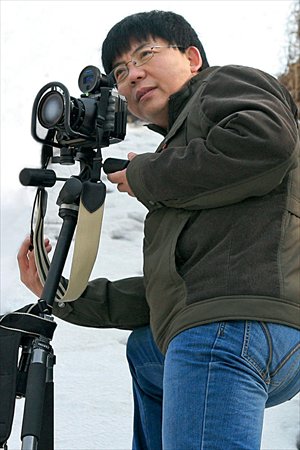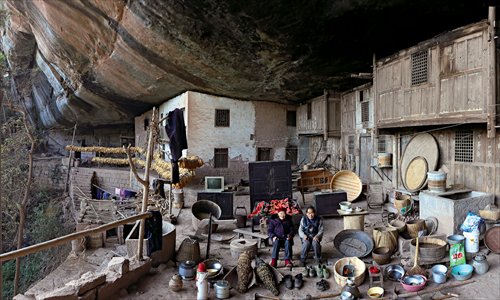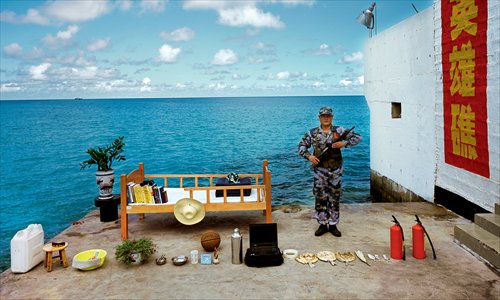Everything you are
Chinese photographer reflects people’s lives through their belongings

Ma Hongjie Photos: Courtesy of Ma Hongjie

A family in Xiangyang village, Hubei Province

A soldier in Hainan Province
Family belongings, which are usually regarded as symbolic of a family's wealth and status, can also become storytellers that bear witness to the lives of their owners and the march of time.
This is what you see as you look at the work of photographer Ma Hongjie in what is probably the first large-scale display of family belongings in China. Spending 11 years and covering almost all the provinces in China, Ma photographed the family belongings of 45 families across the nation. Together, they reveal to the audience a real and changing society in which people struggle with the challenges of life.
"Life is both tender and blunt, just like the pictures themselves," Ma told the Global Times.
Letting it all out
From rural villagers living in mountains to "modern gypsies" living on rivers and further on to families making a living with performing monkeys, the families in Ma's photos pose in front of the camera rather poised, standing or sitting, surrounded by belongings accumulated through decades and even generations.
Pots and pans, beds, chairs, cupboards, agricultural implements, animals including dogs, cats, pigs, sheep and cattle, modern equipment like TV sets, washing machines, motorbikes and even cars, these belongings show the warmth of life and depth of history of many Chinese families.
Opening the book collecting Ma's photos, the recently published The Family Belongings of Chinese People, is like walking into a room with 45 families and listening to their stories face to face, particularly when the photographer is considerate enough to add rich notes which elaborate more on each family's story.
From his first picture taken in 2003, Ma spent 11 years altogether to finish this huge project, eventually managing to persuade nearly 50 families to empty their houses and display their belongings in broad daylight.
"All the families are ordinary families we see around us and most of them are from the countryside. Many of them don't have many belongings, but they don't feel ashamed to display what they do have. They are rather open and show poise. Rather, it was the wealthy people who were not very willing to show their belongings," Ma explained, adding that he tried to find a Shanxi coal boss family willing to have their picture taken but failed.
Covering a large geographical area, a wide-range of social classes and ethnic groups, the photos are also of great significance when it comes to sociology and anthropology.
A rich journey
Each time Ma found an ideal family, the first thing he did was to ask the family to take all their belongings and place them in front of their homes, as that was the core idea behind the series. "I would show them pictures I had taken before and explain. Most of them didn't decline," Ma told the Global Times.
Of course taking such photos was not without its difficulties. Once, while he was waiting to take a picture of a Kazakh shepherd's belongings in Aksai, Gansu Province, in 2007, the head of the township happened to come across them and didn't allow Ma to take any pictures, claiming that such photos would be "bad for the image of the Kazakh people."
Ma waited for an hour, hoping the official would leave. But he remained there and seeing Ma's persistence he suggested Ma shoot according to his arrangement. Instead of moving everything out, he asked the family to place a rug behind the tent they lived in, putting some snacks and milk tea on it and drove the family's sheep back home so they could surround the family members.
"I wasn't willing to put the picture in the collection at first, but on second thought, I realized it would be interesting to tell this story to readers," explained Ma.
Another time, a village official also showed up when he was taking pictures of a family in Yixing, Jiangsu Province. He would not allow the shoot until Ma called the publicity official in the township and explained his intentions.
"Local officials are pretty typical, worrying pictures of poor families under their management might shame and discredit them."
Beyond these types of obstacles, Ma was also risking his life. In 2009, Ma was bitten by a dog while looking for an ideal family in Medog, Tibet. The bite left a 10-centimeter gash on his leg. At the time, there were no rabies vaccinations in the local region and the Medog Highway was not available. It was thanks to his friend in the nearby Bomi military station that he managed to get a vaccination shot before it was too late.
"I still feel afraid to this day. Because you just have to trust your luck if you fail to get a shot within 24 hours," Ma said, as he showed me the scar on his right leg.
Continuing work
According to Ma, the Family Belongings series is a project initiated by his employer Chinese National Geographic. Aware of the changes the huge time span the project covered may have brought, Ma revisited some families again to show the changes in their lives.
"Over the past 11 years, some families have changed a lot. Like Cao Mingsheng's family, which shows in their renovated house and new belongings. Some changed little, like Long Yunping's, with only numerous modern pictures (featuring new national leaders) marking the change of time," Ma said.
While most of the families in his photos are from the countryside and not affluent, Ma's work possesses a much deeper meaning beyond just showing their belongings. "You can see that we have tried our best all our lives just to live a normal person's life. A peaceful life that can be easily disturbed by the outside," Ma remarked.
"Through the belongings of these ordinary families, I want to reflect their stories and lives. They are actually a minority that needs attention in a rapidly developing China."
Apart from his Family Belongings series, Ma has been dedicated to exploring the lives and fate of people from the lower end of the social ladder, as shown in his series which include Western Weddings, Quarry and Monkey Trainer.
Ma's concern for disadvantaged groups has a lot to do with his personal experiences. Born to a working class family in 1963 in Henan Province, Ma spent most of his childhood in a destitute countryside with his grandparents. The hardships of farmers made a deep impression on him and exerted a big influence on his later photography.
Next he is looking to embark on a series that will record quickly disappearing ways of life, a project that will keep him continually busy for years. "The ability to continue is a kind of strength," said the photographer.